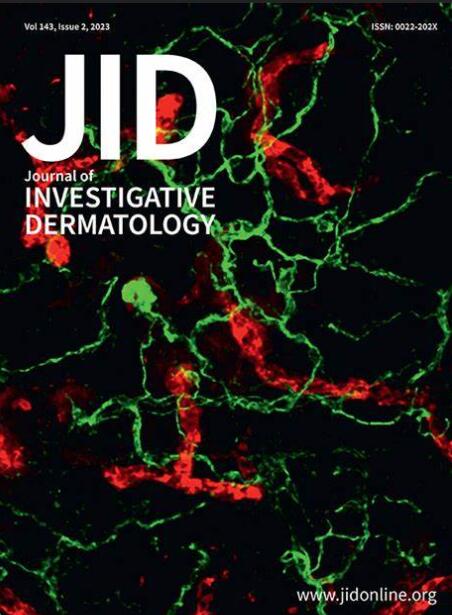Anti-Laminin β4 IgG Drives Tissue Damage in Anti-p200 Pemphigoid and Shows Interactions with Laminin α3 and γ1/2 Chains
IF 5.7
2区 医学
Q1 DERMATOLOGY
引用次数: 0
Abstract
Laminin β4 was recently identified as a structural component of the dermal-epidermal junction and autoantigen of anti-p200 pemphigoid. In this study, we provided further evidence of the pathogenic effect of anti-laminin β4 IgG and identified potential binding partners of laminin β4. We showed that laminin β4 immune complexes led to activation of normal leukocytes and dose-dependent ROS release. Using cryosections of normal skin, we demonstrated that anti-laminin β4 patient serum IgG but not anti–laminin γ1 IgG, which are also detectable in patients with anti-p200 pemphigoid, cause dermal-epidermal separation in the presence of leukocytes. Proximity ligation assay and indirect immunofluorescence staining suggested that laminin β4 localizes closely to laminin α3 and γ2 in primary keratinocytes. Subsequent coimmunoprecipitation experiments using epidermal extracts confirmed the interaction of laminin β4 with the α3 and γ2 chains and indicated additional affinity to laminin γ1. The laminin β4-α3/β4-γ1 protein complexes were also detected using mass spectrometry. In conclusion, this study showed that anti–laminin β4 IgG can exert tissue damage in the skin, supporting their pathogenic role in anti-p200 pemphigoid. Our data further provide strong evidence for an interaction of laminin β4 with laminin α3, whereas its association to the laminin γ1 and γ2 chains is ambiguous.
抗层粘蛋白 β4 IgG 驱动抗 p200 丘疹性荨麻疹的组织损伤,并与层粘蛋白 α3 和 γ1/2 链相互作用
最近,层粘连蛋白β4被确定为真皮-表皮交界处的结构成分和抗p200丘疹性荨麻疹的自身抗原。在本研究中,我们提供了抗层粘蛋白β4 IgG致病作用的进一步证据,并确定了层粘蛋白β4的潜在结合伙伴。我们发现,层粘连蛋白 β4 免疫复合物可导致正常白细胞活化和剂量依赖性 ROS 释放。利用正常皮肤的冰冻切片,我们证明了抗层粘蛋白β4患者血清中的IgG,而不是抗层粘蛋白γ1患者血清中的IgG(在抗p200丘疹性荨麻疹患者中也能检测到),会在白细胞存在的情况下导致真皮-表皮分离。近接实验和间接免疫荧光染色表明,层粘连蛋白β4在原代角质形成细胞中与层粘连蛋白α3和γ2紧密定位。随后使用表皮提取物进行的共免疫沉淀实验证实了层粘连蛋白β4与α3和γ2链的相互作用,并表明其与层粘连蛋白γ1有额外的亲和力。质谱也检测到了层粘连蛋白β4-α3/β4-γ1蛋白复合物。总之,本研究表明,抗层粘蛋白β4 IgG 可对皮肤组织造成损伤,支持其在抗 p200 丘疹性荨麻疹中的致病作用。我们的数据进一步为层粘蛋白β4与层粘蛋白α3的相互作用提供了强有力的证据,而层粘蛋白β4与层粘蛋白γ1和γ2链的关联则不明确。
本文章由计算机程序翻译,如有差异,请以英文原文为准。
求助全文
约1分钟内获得全文
求助全文
来源期刊
CiteScore
8.70
自引率
4.60%
发文量
1610
审稿时长
2 months
期刊介绍:
Journal of Investigative Dermatology (JID) publishes reports describing original research on all aspects of cutaneous biology and skin disease. Topics include biochemistry, biophysics, carcinogenesis, cell regulation, clinical research, development, embryology, epidemiology and other population-based research, extracellular matrix, genetics, immunology, melanocyte biology, microbiology, molecular and cell biology, pathology, percutaneous absorption, pharmacology, photobiology, physiology, skin structure, and wound healing

 求助内容:
求助内容: 应助结果提醒方式:
应助结果提醒方式:


